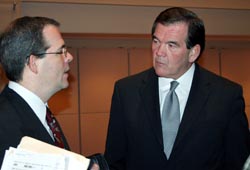Educators talk terror with Tom Ridge
 Photo by Paige Ozaroski
Former Governor Tom Ridge talks with audience member Greg Ciaverelli, of Philadelphia, after the panel discussion,"Terrorism on the Homefront."
|
What inspires terrorist acts? How does terrorism operate in the 21st century?
In an effort to explore answers to these and other questions, Tom Ridge, former governor of Pennsylvania and first secretary of Homeland Security, spoke to a full house of students, faculty and community members during a panel discussion titled “Terrorism on the Homefront” held at the American Philosophical Society in Philadelphia on Nov. 13. The event was hosted by Temple University.
|
|
When asked to comment on what students should draw from the discussion, Ridge responded, “We need to make our education global and reach out to understand the cultural and historical issues of other nations. We need to understand that America’s future depends on its relationship with the rest of the world.” Co-sponsored by The Institute for Mediterranean Affairs and Temple University’s College of Liberal Arts and Center for the Study of Force and Diplomacy, the panel brought together a range of perspectives for a lively discussion and question-and-answer session. In addition to Ridge, leading experts on hand were Marc Sageman, a senior fellow at the Foreign Policy Research Institute; Jessica Stern, academic director of the Program on Terrorism and the Law at Harvard Law School; and Ian Lustick, professor of political science at the University of Pennsylvania. “As we have done in the past, Temple was able to attract the top experts to engage in a dialogue with the community, which is a major part of our goal at CENFAD,” said Richard Immerman, moderator of the discussion and Professor of History and Marvin Wachman Director of CENFAD at Temple. In his talk, Sageman, author of Leaderless Jihad and the best-selling Understanding Terror Networks, challenged conventional assumptions in a post 9/11 world about who joins terrorist groups and why, suggesting that today’s terrorist acts are carried out by spontaneously self-organized groups of trusted friends who become radicalized when images of global horror resonate with personal experience. Stern, author of Terrorism in the Name of God: Why Religious Militants Kill, similarly disputed conventional wisdom by questioning whether or not Americans’ association of terrorists with particular characteristics — such as poverty, lack of education or lack of democracy — actually holds up under closer scrutiny. Offering a look at the bigger picture, Lustick, author of Trapped in the War on Terror, posed the possibility that the War on Terror has itself become our country’s biggest threat — a threat that is spiraling out of control, undermining American confidence and isolating Americans from the rest of the world. Ridge commended the panelists for their insightful work, saying that we need to understand more fully the ideologies of terrorists and that academics can help us explore the answers to these very important questions. “Tonight’s presentation was an excellent example of academic freedom and dialogue at work,” said College of Liberal Arts Dean Teresa Scott Soufas. “The panelists presented multiple perspectives and offered different interpretations of our situation after 9/11. And this is what educators do.”
|
|